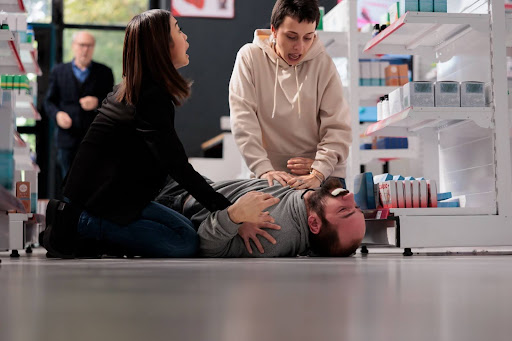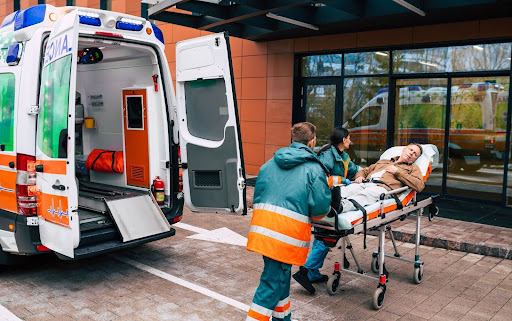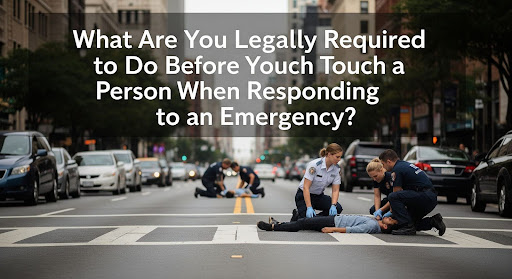When responding to an emergency, one of the most important considerations is the legal requirements surrounding your actions, especially when it comes to physically assisting someone. The primary step is to obtain consent before touching or providing any aid to a person in distress. This ensures that you remain within the boundaries of the law while respecting the individual’s rights.
Let’s explore the key steps and legal considerations you must keep in mind when responding to an emergency medical service:
1. Obtain Informed Consent (If Possible)
If the person is conscious and able to communicate, the first thing you need to do is introduce yourself and explain your intent to help. It’s essential to ask for explicit consent before providing any assistance.
Here’s an example of how to approach the situation:
- “Hi, my name is [Your Name], and I’m trained in CPR. I’m here to help you. May I assist you?”
This simple request ensures you are legally and ethically clear to proceed. If they agree, you can provide aid, knowing you have their permission. If they refuse help, it’s your legal responsibility to respect their decision. Touching or intervening without consent could lead to assault or battery charges, depending on local laws.
2. Implied Consent (If the Person is Unresponsive)
What if the person is unconscious, unresponsive, or unable to communicate due to injury or medical conditions? In such cases, implied consent applies. This means that it is assumed the person would want help if they were able to give consent.
In these situations:
- Implied consent allows you to provide life-saving measures, like CPR, to help prevent further harm. The priority is to preserve life and prevent further injury while awaiting professional medical help.
- For example, if someone collapses in front of you and is unresponsive, you are legally permitted to begin administering first aid or CPR immediately.
It’s important to remember that implied consent applies when someone cannot provide explicit consent, but the goal is always to save lives.

3. Good Samaritan Laws: Protection for Volunteers
In the U.S., Good Samaritan laws exist to protect individuals who provide emergency care in good faith. These laws vary slightly from state to state but are generally designed to protect you from civil liability if something goes wrong while you’re assisting someone in an emergency.
Here are the key protections under Good Samaritan laws:
- Protection from Liability: If you assist someone in an emergency situation, you are typically shielded from lawsuits, even if your actions don’t prevent injury or death, as long as you acted reasonably and without gross negligence.
- Limitations: These laws do not protect you if you engage in gross negligence or willful misconduct. If you perform actions outside your training or act recklessly, you could be held liable.
Good Samaritan laws exist to encourage people to help others during emergencies without fear of legal repercussions, as long as they act in good faith and within their skill level.
4. Prioritize Safety First
Before attempting to assist someone, your own safety is paramount. The emergency scene may present dangers, and you should assess the area for potential hazards before offering help.
Key considerations include:
- Fire or Smoke: Is the area at risk of a fire or explosion?
- Electrical Hazards: Are there downed power lines or electrical wires present?
- Hazardous Materials: Are chemicals or toxic substances present that could cause further harm?
- Traffic: Is the person lying on or near a busy road, putting both themselves and you at risk?
If the scene is unsafe, your first priority is to get to safety and call for help. Don’t attempt to assist if doing so puts you in danger. Instead, contact emergency services immediately to ensure professional responders can handle the situation safely.

5. Call Emergency Services
Regardless of the situation, always call 911 (or your local emergency number) as soon as possible. It’s critical to have professional medical responders on the way.
When calling:
- Provide specific information about the location and the condition of the person in need.
- Explain any actions you’ve already taken, such as CPR or first aid, so that dispatchers can provide additional guidance.
Emergency services have the tools, training, and authority to manage medical emergencies. Your prompt call is essential in ensuring the right help arrives quickly.
Also Read: Heaving or Squeezing Would Be Indicated by Which Signs
6. Understanding Local Laws
While the general principles outlined above apply in most states, it’s essential to understand local laws, as some states have unique regulations regarding emergency assistance. Some states impose a Duty to Act, meaning that certain individuals, such as bystanders or professionals, may be legally obligated to assist in emergencies.
For example:
- Vermont and Minnesota have laws requiring people to offer reasonable assistance to those in danger if they can do so without risking their own safety.
- In states without such laws, there is typically no legal obligation to help unless you are a healthcare professional or public safety worker.
Consulting a legal professional can be helpful if you have concerns about your rights and responsibilities in specific emergency situations.
Frequently Asked Questions
1. What should I do if someone refuses help in an emergency?
If someone refuses help, you must respect their decision. Forcing assistance on a person who does not want it can result in legal consequences. Always ask and clarify before intervening.
2. What happens if I perform CPR without proper training?
Good Samaritan laws protect individuals who perform CPR in good faith, even if they are untrained, as long as their actions do not involve gross negligence. However, it’s best to receive training for maximum effectiveness.
3. Can I be held liable for providing help in an emergency?
Good Samaritan laws generally protect you from liability, as long as you act within your training and do not engage in gross negligence or intentional harm. Always act in good faith.
4. Do I have to help if I witness an emergency?
In most states, you are not legally required to assist unless you are a trained professional. However, it is an ethical responsibility to help when you can, especially if you have the knowledge and ability to provide aid.
Conclusion: Legal vs. Ethical Responsibilities in Emergencies
While the law provides clear guidelines, your ethical responsibility to assist those in need is just as important. Always act in the interest of saving lives, preventing harm, and helping in a way that’s legally appropriate.
When responding to an emergency, remember that obtaining consent, prioritizing safety, and calling for professional help are essential first steps. By understanding the legal framework surrounding emergency response, you can confidently offer assistance in a way that aligns with the law and promotes the well-being of those in need.







